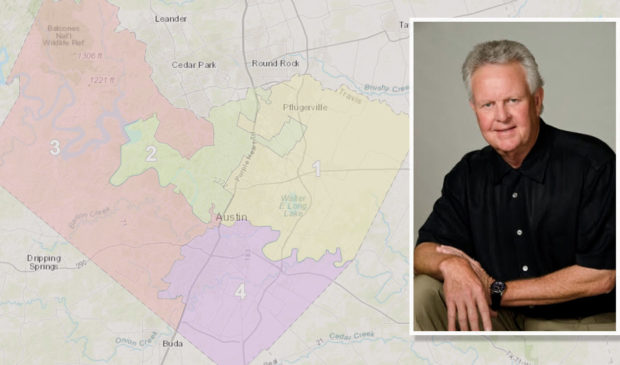Commissioner Daugherty still working to pave the road ahead
Thursday, January 3, 2019 by
Ryan Thornton Travis County Commissioner Gerald Daugherty is not in the business of telling Travis County residents what they should want or need. Instead, both on the dais and in conversation, the Precinct 3 commissioner, businessman and longtime Austin resident resists the allure of silver-bullet solutions, looking primarily to market-based answers to the complexities of our given moment.
During a recent interview with the Monitor, Daugherty reflected on the double-edged sword of the region’s growing economic prosperity and the delicate balance of providing for residents while preserving their freedom to live how they choose.
The region’s growth has led to a rising affordability crisis which Daugherty expects will only get worse. “For the first time in the 50 years that I’ve been here, I’m really, really concerned about Austin because from an affordability standpoint, it’s not here any longer,” he said.
Daugherty said the problem is particularly pronounced in western Travis County, where median household income is already well above the county average and there is strong community desire to maintain quality of life and protect green spaces from development. While the area’s abundant open spaces are part of its appeal, Daugherty said preservation efforts limit housing supply. “You have a lot of real estate that you can’t do anything with.”
When application for an affordable multifamily development near Lakeway came to the court for approval in November, the commissioner voiced firm support for the units, which will be affordable enough to house a number of families and individuals who currently work in the area but cannot afford to live nearby. Nonetheless, Daugherty said real estate, not government, is the key to solving the area’s lack of housing options on a larger scale.
Whether or not housing supply can keep up with rapidly increasing demand is a serious concern for the commissioner. “The euphoria that has come out in the last 48 hours about Apple’s intention (to open an Austin campus) … really frightens me because the first thing that does is it takes the rooftops, the very limited number of dwelling places … and raises that valuation even higher than what it is right now.”
As Daugherty does not believe in dramatic government solutions for regional housing scarcity, neither does he believe in them for transportation, which he says is the region’s greatest challenge. The commissioner has long fought for expanded road capacity to accommodate the region’s growth without nudging people out of their cars. “I am very much of the opinion that you have to accommodate more robustly where the majority of the people elect to be and to use, and the automobile in the United States of America is king,” he said.
As a whole, Daugherty thinks 2018 has turned out to be a fruitful year for road capacity in Travis County. The greatest of these successes is State Highway 45 Southwest, a 3.6-mile toll road connecting Hays County to Austin that the commissioner has championed since first running for office in 2002. “I think we’ll be cutting a ribbon on that in spring of ’19,” he said.
Daugherty said he is also encouraged by the Texas Department of Transportation’s commitment to doing the controversial Oak Hill Parkway project without the use of tolling. “We still haven’t started it yet but I think that we at least have the makings to get this thing started in the next 24 months.”
When it comes to other types of solutions to transportation problems, Daugherty isn’t as enthusiastic. When asked for comment on Capital Metropolitan Transportation Authority’s Project Connect plan, he remarked that it was likely not a viable solution in the region. “I don’t think you can get enough people out of their cars into public transit even if you have great public transit,” he said.
Looking ahead, the 86th Texas legislative session beginning in January poses a serious threat to the county’s ability to raise the funds it needs to continue providing its current level of services. Gov. Greg Abbott’s desired 2.5 percent annual cap on revenue increases would severely limit the county at a time when the need for funding is greater than ever.
“I am most concerned about the Legislature limiting what we can do with generating the dollars that it takes us to operate county government,” Daugherty said. “If we get some sort of an artificial cap on what it is that we can do, then that is very scary to me.”
Noting that while he is a conservative in favor of keeping taxes as low as possible, Daugherty said the Texas Legislature does not sufficiently understand social needs and their costs at the county level.
“I think what people really don’t understand is when we are in as good of economic times as we are in, why don’t we have enough money to take on things without having to raise taxes,” he said. “That’s the reason that I think the Legislature feels like they’re the ones that have to help people.”
Photo courtesy of Travis County.
The Austin Monitor’s work is made possible by donations from the community. Though our reporting covers donors from time to time, we are careful to keep business and editorial efforts separate while maintaining transparency. A complete list of donors is available here, and our code of ethics is explained here.
You're a community leader
And we’re honored you look to us for serious, in-depth news. You know a strong community needs local and dedicated watchdog reporting. We’re here for you and that won’t change. Now will you take the powerful next step and support our nonprofit news organization?











